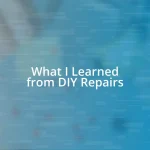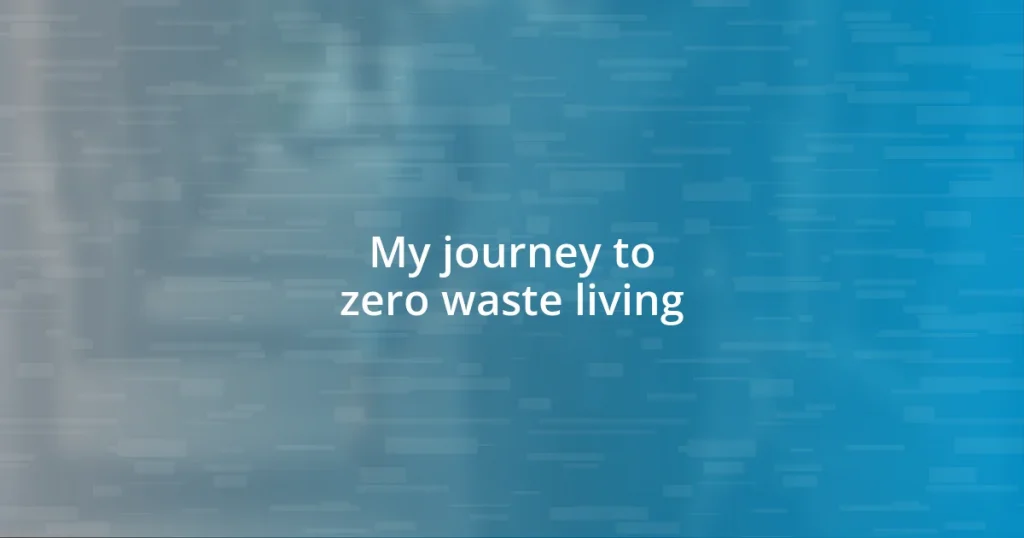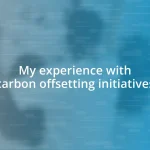Key takeaways:
- Zero waste living is rooted in mindfulness and has transformative effects on personal habits and environmental impact, emphasizing the importance of intentional consumption.
- Practical changes like composting, using reusable bags, and questioning purchasing habits can significantly reduce waste and foster a sustainable lifestyle.
- Building a supportive community and setting small goals are crucial for maintaining motivation and overcoming challenges in the zero-waste journey.
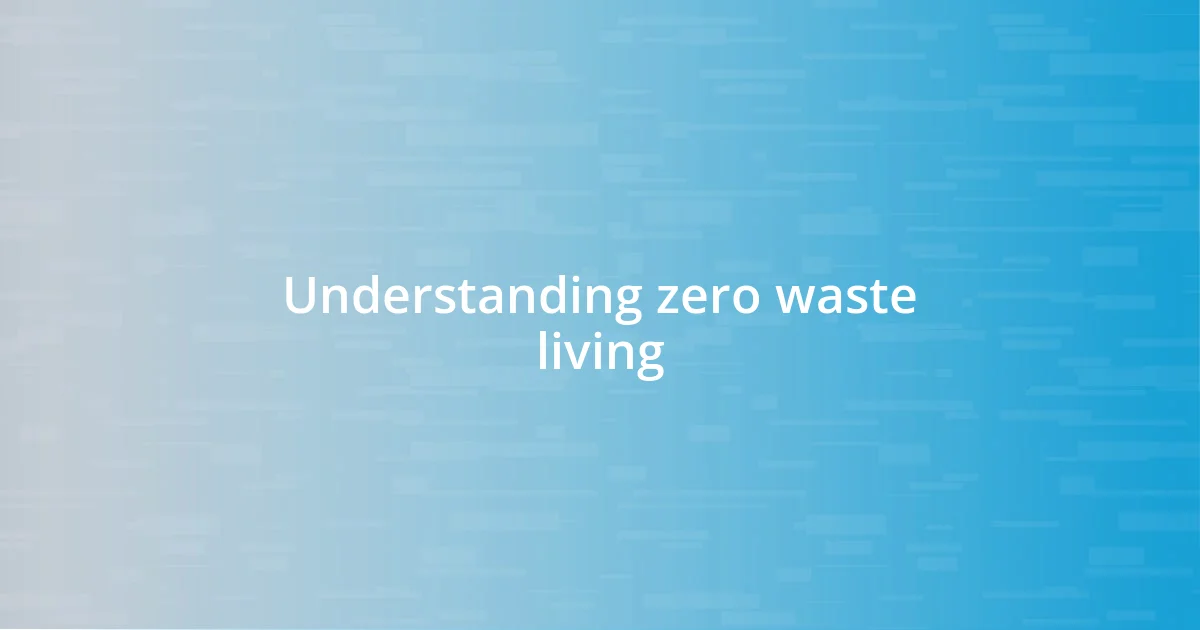
Understanding zero waste living
Zero waste living is more than just a trend; it’s a lifestyle choice rooted in mindfulness and sustainability. I remember the first time I tried to reduce my waste—I felt both overwhelmed and excited. How could a single person make a difference? It turns out, small changes really do add up.
One of the core principles of zero waste living is to rethink our consumption habits. Initially, I struggled with the idea of ditching single-use plastics, but as I replaced my plastic bags with reusable ones, I realized how empowering it was. Each time I said no to a plastic straw or opted for a glass container instead, I felt like I was taking control—not just of my waste, but of my impact on the planet.
Embracing zero waste living invites us to challenge our societal norms around consumption, and I often found myself asking, “Do I really need this?” That simple question reshaped my shopping habits and, over time, it brought a sense of clarity and purpose to my everyday decisions. The journey isn’t always easy, but the personal growth I’ve experienced has made every effort worthwhile.
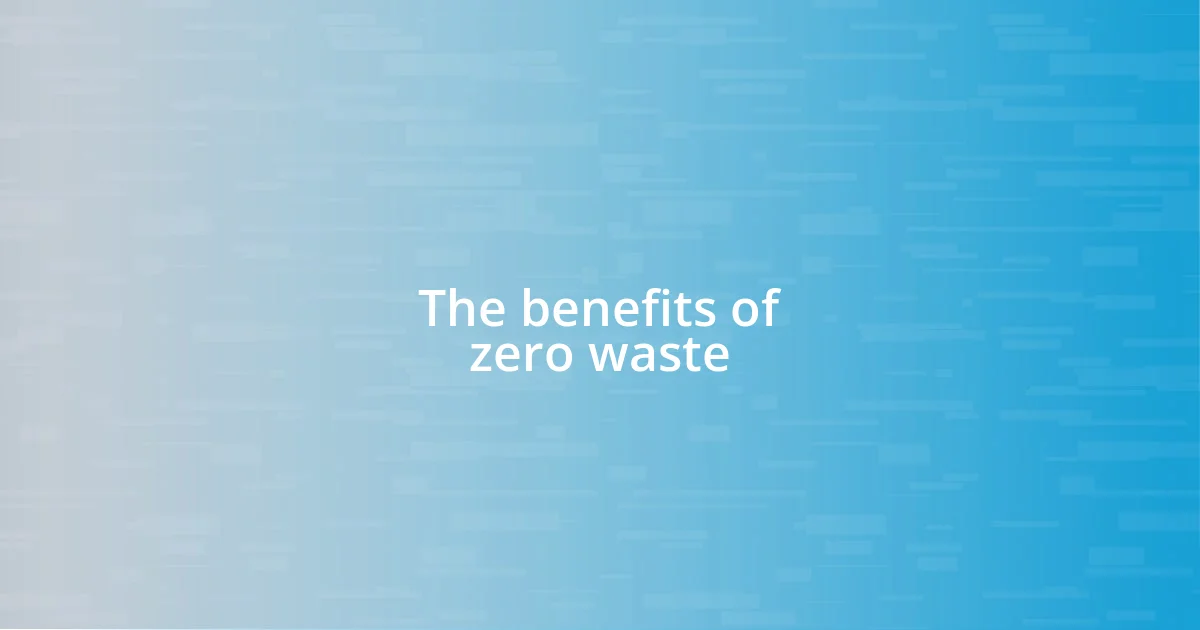
The benefits of zero waste
Living a zero waste lifestyle brings numerous benefits that can transform both our environment and personal well-being. For instance, I noticed how reducing my waste not only lightened the load on my conscience but also eased my mind when it came to clutter at home. Embracing minimalism through zero waste had a calming effect, fostering a simpler, more intentional way of living.
Here are some compelling benefits:
- Environmental Impact: Less waste contributes to a healthier planet by reducing landfill overflow and pollution.
- Financial Savings: I found that buying less and opting for durable items saved me money in the long run—who knew spending less could feel so rewarding?
- Healthier Lifestyle: By choosing whole foods and homemade products, I felt more energized and in tune with what I was consuming.
- Community Connection: Sharing zero waste tips and swaps with friends sparked meaningful conversations, helping to build a supportive community around sustainable living.
- Personal Growth: Each small victory in reducing waste has taught me resilience and accountability, which has been incredibly fulfilling.
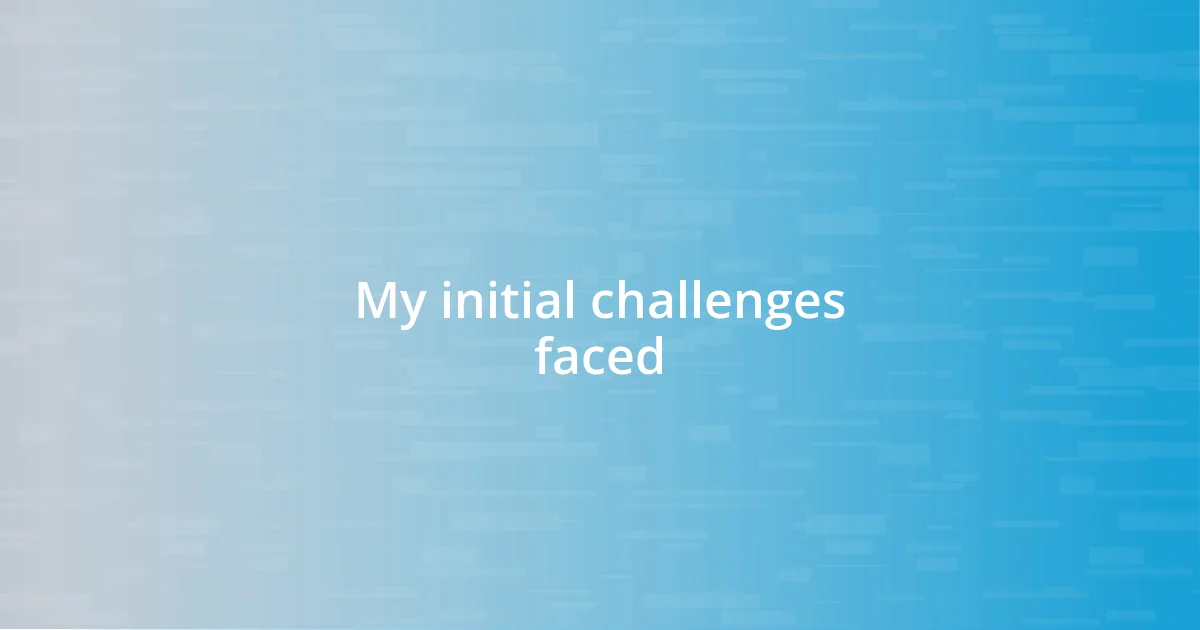
My initial challenges faced
Initially, I faced a barrage of challenges on my zero waste journey, starting with the sheer volume of waste I was generating. It was alarming to actually look at the trash I produced in a week; I felt embarrassed and discouraged at first. I vividly remember that first clean-up; sorting through those heaps of packaging made me realize how blind I had been to my daily consumption habits.
Another hurdle was the social dynamic surrounding waste reduction. I often found myself in situations where friends were unaware of my new choices. I recall attending a party where everything was served in single-use containers—standing there with my reusable plate felt awkward. It took time to communicate and navigate these situations, but it also opened doors for discussion about sustainability, creating a shared space for growth with those around me.
Lastly, retraining my mind to identify alternatives became a formidable task. The first time I entered a grocery store without a shopping list was chaotic, to say the least. I instinctively reached for products that had convenient packaging, only to recount my waste goal moments later. The struggle was real, but finding local bulk stores and discovering creative DIY solutions eventually transformed my approach to shopping. It became a blend of discovery and adaptation, fostering not only my commitment but also my creativity in living more sustainably.
| Challenges | Personal Anecdotes |
|---|---|
| Trash volume awareness | Sorting through my week’s trash opened my eyes to my waste habits. |
| Social dynamics | Feeling awkward at a party with my reusable plate contrasted with single-use options. |
| Mental retraining | Walking into a grocery store without a plan made sustainable choices tougher. |
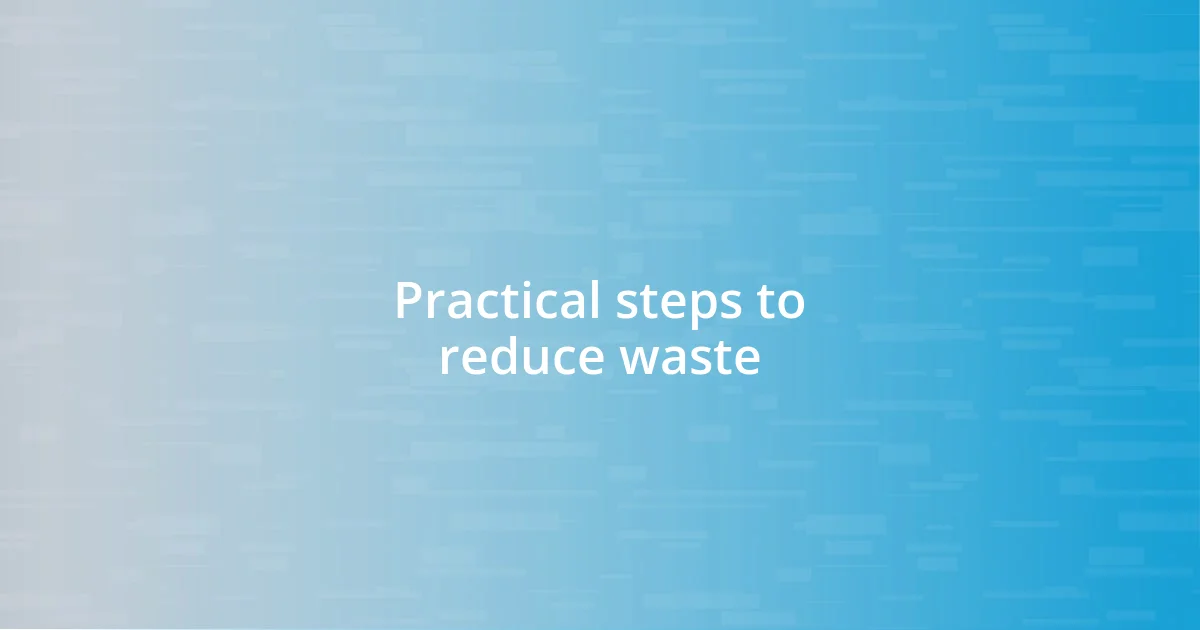
Practical steps to reduce waste
When it comes to reducing waste, one of the simplest practical steps is to start a compost bin. Imagine tossing fruit scraps and vegetable peels into a designated spot instead of your trash can. My first attempt at composting was a revelation—I loved watching kitchen scraps transform into rich soil, perfect for my garden. It made me realize how much organic waste I had been sending to the landfill previously. Plus, it’s an easy way to connect with nature and nurture your plants simultaneously.
Another step I embraced was carrying reusable bags everywhere I went. It might seem trivial, but it transformed my shopping experience. I now always have a stash of them in my car, purse, and even my work bag. The first time I used my bag at a grocery store instead of a single-use one, I felt a rush of pride. Have you ever stopped to think about how many bags we accumulate over time? This simple change not only cuts down on plastic waste but also serves as a reminder of my commitment to the environment.
Lastly, I challenge you to reflect on your purchasing habits. Before I decide to buy anything, I ask myself: “Do I really need this? Can I repurpose something I already own?” This practice has significantly shifted my mindset, helping me avoid impulse purchases. There was a time when I bought items without much thought—binge-shopping became a habit. Now, intentionality has become my guiding principle, enriching my life while keeping waste at bay. Have you ever tried pausing before a purchase? It’s a game changer!
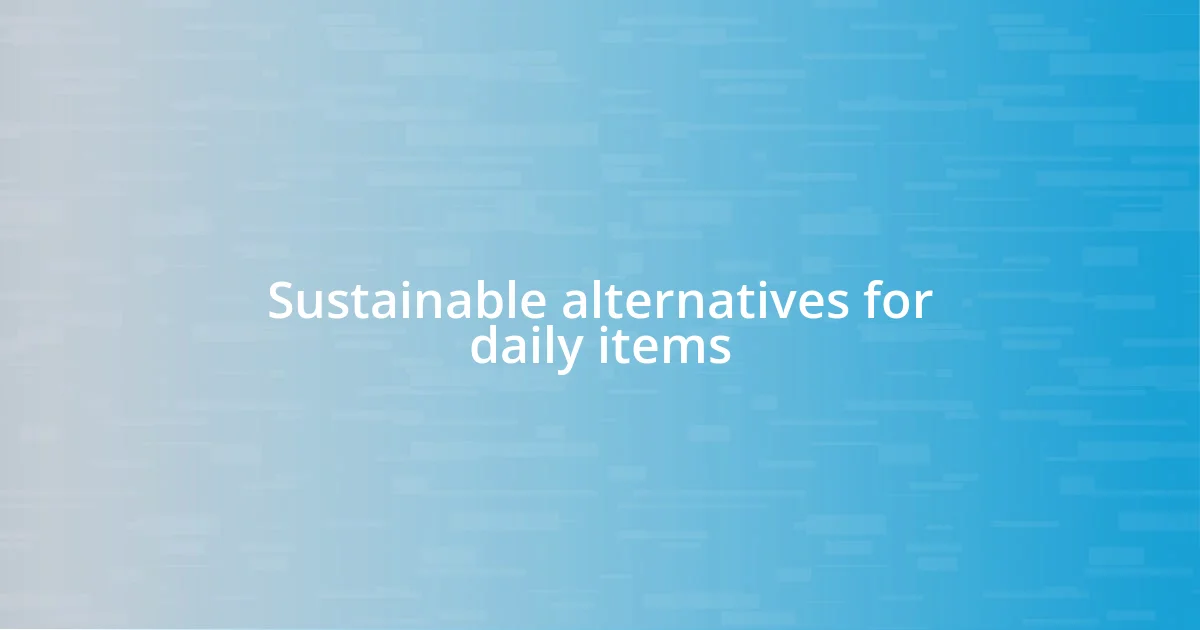
Sustainable alternatives for daily items
Choosing sustainable alternatives for daily items is a journey filled with discovery. I remember the first time I swapped out my plastic toothbrush for a bamboo one. The switch felt small, but it was empowering! Every time I brushed my teeth, I took a moment to reflect on my impact, knowing I wasn’t contributing to landfill waste. Have you ever made a tiny change that felt monumental? It’s these conscious choices that build the foundation for a zero-waste lifestyle.
When I replaced conventional cleaning supplies with eco-friendly options, I experienced another layer of transformation. I began making my own all-purpose cleaner from vinegar and essential oils. The first whiff of the fresh lemon scent changed my perception about cleaning; I started to see it not just as a chore, but as an act of love for my home and the planet. How often do we overlook the invisible toxins in our homes? This switch made my space feel not only cleaner but also healthier for me and my family.
Let’s talk about food storage—an area I didn’t think much about until I discovered beeswax wraps. I used to rely on plastic wrap, but using these reusable alternatives felt like turning over a new leaf. The first time I wrapped up leftover quinoa and found it still fresh days later, I felt a wave of satisfaction. It made me wonder: how many times had I thrown away spoiled food simply because I didn’t consider sustainable storage? Switching to beeswax wraps helped me reduce waste considerably while keeping my food fresh, and that’s a win in my book!
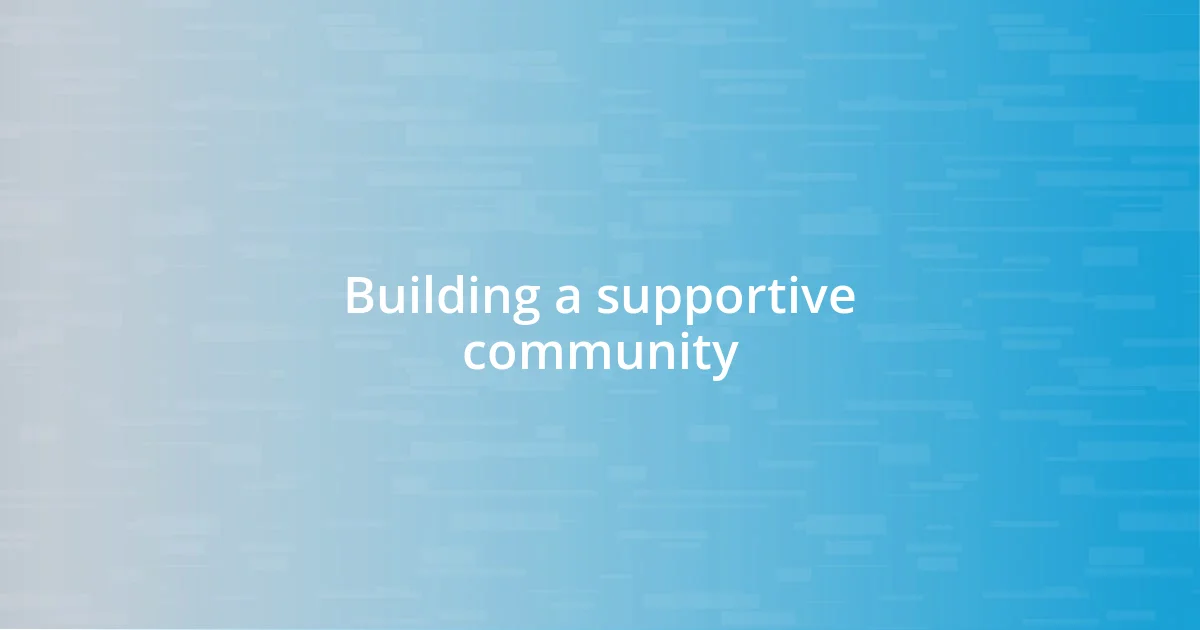
Building a supportive community
Having a supportive community can truly make a difference in your zero-waste journey. I remember when I first connected with a local group focused on sustainability; it felt like finding my tribe. Sharing experiences and tips with others who shared the same values was energizing. Have you ever felt that sense of belonging when discussing a passion? It fueled my motivation to stay committed to reducing waste.
I’ve also noticed the power of collaboration in this shared mission. Organizing community clean-up events is one way I’ve engaged others to come together and make an impact. The excitement of cleaning up our local parks while chatting with friends made the day enjoyable and purposeful. What’s even more rewarding is seeing others spark new ideas; just last month, someone suggested a plant swap that brought in not only new plants but new friendships. Isn’t it amazing how collective action can transform individual efforts into impactful experiences?
Online platforms have played a crucial role in broadening my support network as well. By following inspiring zero-waste influencers and joining social media groups, I’ve gained knowledge and encouragement from people worldwide. One moment that stood out was when someone shared their own struggle with balancing convenience and waste. I realized I wasn’t alone in facing challenges, and it motivated me to persevere. It’s incredible how just a few clicks can connect us to like-minded individuals who inspire and uplift each other. Have you explored these virtual communities? They can be a treasure trove of support!
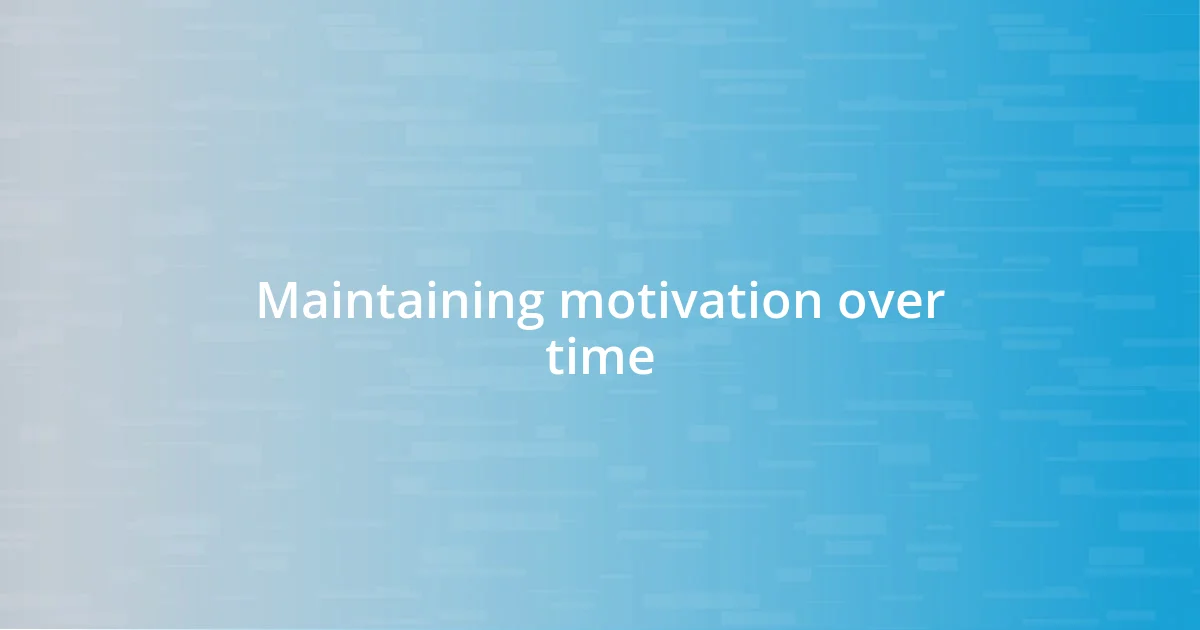
Maintaining motivation over time
Staying motivated on the zero-waste journey can be challenging, especially when the changes can feel overwhelming. I remember hitting a plateau where the excitement of my early changes faded, and I began to question my efforts. Instead of giving up, I started to compile a visual diary of my progress. Each image of a flourishing garden I nurtured with homemade compost or a stack of reusable bags reminded me of my achievements. Have you ever found that visual reminders can reignite your passion? It worked wonders for me.
To sustain my motivation, I set small, achievable goals and celebrated each one. For example, I made it a point to reduce single-use plastic significantly in just one month, and when I succeeded, I treated myself to a small plant. It’s amazing how minor victories reinforce our commitment. Has there been a milestone in your life that made a difference? I discovered that by recognizing even the smallest accomplishments, I kept my spirit alive and inspired to tackle larger challenges.
I also learned that routine reflection plays a pivotal role in maintaining motivation. Journaling my experiences and feelings about my zero-waste lifestyle provided clarity. One evening, after a long day, I took a few moments to jot down my struggles and triumphs of the week. This visual and emotional documentation allowed me to recommit to my goals with renewed energy. Have you tried reflecting on your journey? I found it to be a powerful way to stay connected with my purpose and keep pushing forward.





